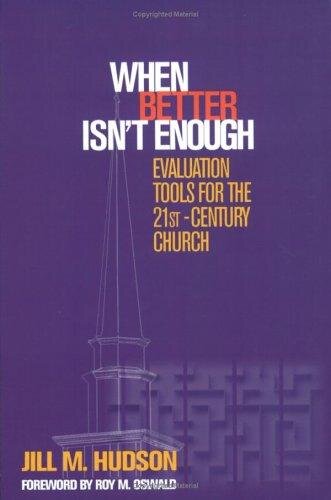Jill Hudson, When Better Isn’t Enough: Evaluation Tools for the Twenty-First Century Church. Alban Institute, 2004.
Referenced in:
LifeandLeadership.com Summary
This is an excellent volume which addresses pastoral evaluation in light of postmodern realities. As she says,
“New occasions call for new duties. As pastors engage in new roles, they will also need to relinquish roles that have been meaningful and productive in the past.” (27)
An example is pastoral visitation, which in the 40s and 50s meant periodic home visitation, which stills shows up on many evaluation forms. Today, however, most postmodern families expect a visit only in times of crisis. Another example is that churches often say they want leadership, when they actually mean management.
Management maintains the status quo with hopes for reasonable strength and growth in the organization. Leadership requires vision, risk taking, and change in the organization’s life. When churches say they desire a transformational leader, they usually have no idea what they are asking for. (27)
Hudson encourages churches to rethink the roles of their ministers in light of the mission of the church in the postmodern setting, and to establish clear understanding for everyone in the congregation. The need is to clarify the standards anew, not only with a view toward the changing cultural realities, but also tailored to the unique styles, sizes, and types of congregations. Unlike many boiler-plate models for evaluation, a more contextualized approach is necessary.
Toward that end, she presents 12 criteria for effective ministry which are adaptable to most current missional contexts:
- The Ability to Maintain Personal, Professional, and Spiritual Balance
- The Ability to Guide a Transformational Faith Experience
- The Ability to Motivate and Develop a Congregation to Be a “Mission Outpost”
- The Ability to Develop and Communicate a Vision
- The Ability to Interpret and Lead Change
- The Ability to Promote and Lead Spiritual Formation for Church Members
- The Ability to Provide Leadership for High-Quality, Relevant Worship Experiences
- The Ability to Identify, Develop, and Support Lay Leaders
- The Ability to Build, Inspire, and Lead a Staff/Volunteer Team
- The Ability to Manage Conflict
- The Ability to Navigate Successfully the World of Technology
- The Ability and Desire to be a Lifelong Learner
Chapter 4 develops each of these criteria in detail, expressing them in light of the demands of ministry in the new era and integrating them with contemporary leadership theory (e.g. Heifetz adaptive leadership). The publisher’s website also provides worksheets to help congregations develop evaluative tools based on the criteria.
This is one of the most helpful resources available for helping churches properly conceive of the minister’s role in the 21st century, and evaluate ministers in terms of what will make them truly effective in these times.
For additional information on this volume, including reviews, click the bookstore links. Be sure to peruse the complete annotated resource lists on Personnel and Minister Evaluation and Ministry Teams, and consult the sections on conducting evaluations/assessments in the General Manuals on Church Administration. It may also help to browse the entire list of Ministry Resource Guides for suggestions on over 100 areas of practical ministry.
From the Publisher
Many sociologists and a growing number of church scholars have noted that we live in a time of transition from the modern era to the postmodern. Whenever a shift of this magnitude occurs, it leaves all of life, including the church, in flux. We instinctively strive to stabilize the situation by re-establishing what has worked in the past. Increasingly, however, congregations are finding that the same old things done harder or better don’t seem to make a difference.
Author Jill Hudson argues, “We must identify new criteria for success, and perhaps even for faithfulness, and hold ourselves accountable to them.” Approaching the postmodern era as a tremendous opportunity, Hudson identifies 12 characteristics by which we can measure effective ministry for the early 21st century.
Based on those 12 criteria, Hudson has created evaluation tools, “an early measuring stick” to help congregations evaluate their work in this new era. Not everything of the past is ineffective and best discarded, she says, nor will everything we try in the future be successful. But by faithfully listening for God’s guidance and carefully evaluating progress using Hudson’s tools, looking at the ministry of the whole people of God as well as that of the professional staff, congregations can improve their ministry, help members and staff grow in effectiveness, deepen a sense of partnership, and add new richness to the dialogue about the congregation’s future.
Editorial Reviews
“Jill Hudson makes us face the hard reality that the world has changed, but the church hasn’t. This gap can create a problem when assessing the effectiveness of church leadership. Practical and easy to read and understand, this book will prove an effective new tool in assisting pastors to lead today.” -Mike Regele
Our kicking and screaming aside, the postmodern church beckons, and Jill Hudson provides guidance and information to equip us for this enormous ministry challenge.” – The Rev. Christine Shiber
About the Author
Jill Hudson is Executive Presbyter, Whitewater Valley Presbytery. Jill served for thirteen years as vocational staff for the Synod of Lincoln Trails. She is a lecturer, trainer, and consultant with special expertise in church systems. She is the author of Alban books Evaluating Ministry and Congregational Trauma: Caring, Coping, and Learning.
***For additional information on this resource, including reviews, click the bookstore links. Check the reference at page top or the links below for resource guides on related topics.***
Other Ministry Resource Guides on Church Administration:
- Administration, General Manuals
- Architecture and Building Issues
- Finance
- Giving and Financial Stewardship
- Management – Leader-Manager Continuum
- Marketing and Communications
- Personnel, Ministerial Evaluation
- Tax, Legal, and Risk-Management Issues
- Technology
- Web Resources, Church Administration
See Resources on Over 100 Areas of Ministry Leadership:


